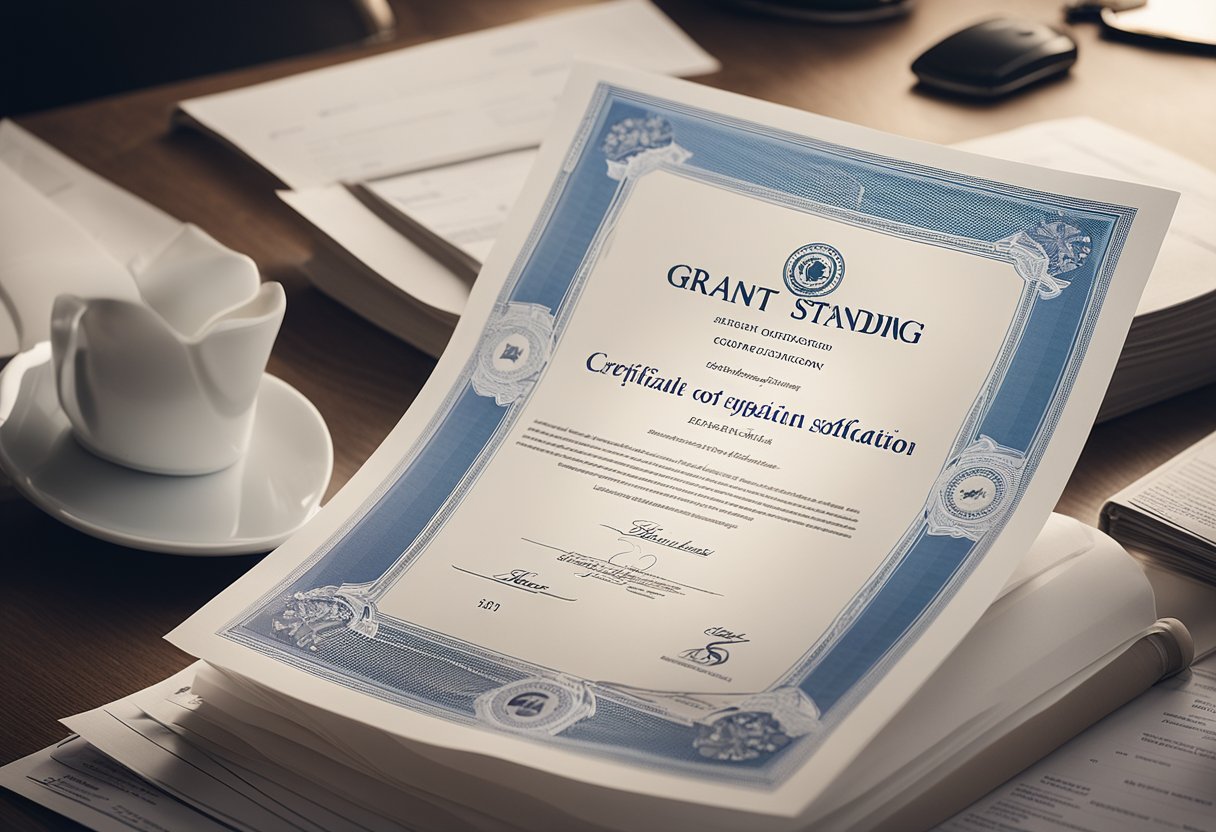When applying for a business grant, there are a variety of eligibility requirements that must be met. One of these requirements may be obtaining a Certificate of Good Standing. This essential document verifies that a business is in compliance with all necessary regulations and has paid all required fees and taxes.

A Certificate of Good Standing is often required by grant providers to ensure that the business is operating legally and responsibly. It is an important indicator of a business’s financial and legal stability, and can help grant providers make informed decisions about which businesses to award funding to.
While not all grant providers require a Certificate of Good Standing, it is important for businesses to be prepared with this document if it is requested. Obtaining a Certificate of Good Standing is a relatively straightforward process that involves submitting an application and paying a fee. By ensuring that they have this essential document, businesses can increase their chances of being awarded a business grant.
Understanding Certificates of Good Standing

Definition and Importance
A Certificate of Good Standing is a legal document that verifies that a business entity is compliant with state regulations and is authorized to transact business in a particular state. It is also known as a Certificate of Existence or a Certificate of Status.
This certificate is important for businesses that are bidding for a business grant because it serves as proof that the business is in good standing with the state agency. It shows that the business has complied with all necessary regulations, paid all required fees, and is authorized to conduct business in the state.
Types of Certificates
There are two types of Certificates of Good Standing: domestic and foreign. A domestic certificate is issued to a business that is registered in the state where it is located. A foreign certificate is issued to a business that is registered in a different state but is authorized to do business in the state where the certificate is being requested.
Validity and Expiration
Certificates of Good Standing have an expiration date, which varies by state. In some states, the certificate is valid for one year, while in others, it may be valid for two or three years. It is important to note that the certificate is only valid for the time period specified and must be renewed before it expires.
Businesses can obtain a Certificate of Good Standing from the Secretary of State or other state agency that is responsible for regulating businesses. The process for obtaining a certificate may vary by state, but it typically involves submitting a request and paying a fee.
In conclusion, a Certificate of Good Standing is an important document for businesses that are bidding for a business grant. It serves as proof that the business is compliant with state regulations and authorized to conduct business in the state. Businesses should ensure that their certificate is up-to-date and renewed before it expires to avoid any issues with their bid for a business grant.
The Role of Good Standing in Business Financing

When a business is seeking financing, it is important to have a good standing with the state in which it is registered. A Certificate of Good Standing is a document that verifies that a business is in compliance with state regulations and has paid all necessary taxes and fees. This document can be required by lenders, banks, and other financial institutions when a business is applying for loans or credit lines.
Accessing Loans and Credit Lines
When a business applies for a loan or credit line, the lender will often request a Certificate of Good Standing. This document provides assurance to the lender that the business is in good standing with the state and has met all of its legal obligations. Without a Certificate of Good Standing, a lender may be hesitant to provide financing to a business.
Building Credibility with Financial Institutions
In addition to its role in accessing loans and credit lines, a Certificate of Good Standing can also help a business build credibility with financial institutions. By demonstrating that the business is in compliance with state regulations and has met all of its legal obligations, the Certificate of Good Standing can help establish the business as a reliable and trustworthy borrower.
Overall, a Certificate of Good Standing is an important document for businesses seeking financing. It can help businesses access loans and credit lines, as well as build credibility with financial institutions. By maintaining good standing with the state and obtaining a Certificate of Good Standing when necessary, businesses can position themselves for success in the world of financing.
Legal and Compliance Aspects for Grants and Funding

When it comes to bidding for a business grant, there are several legal and compliance aspects to consider. It is crucial to ensure that your business is compliant with state requirements and maintains good standing status. Failure to comply with these requirements can lead to disqualification from grant opportunities.
State Requirements for Businesses
Each state has different requirements for businesses operating within their borders. These requirements may include obtaining licenses and permits, submitting annual reports, paying taxes, and registering with the state. It is essential to research and understand these requirements to ensure compliance and avoid any legal issues.
Maintaining Good Standing Status
Maintaining good standing status is an important aspect of compliance for businesses. Good standing status indicates that a business is up to date on all its legal and financial obligations, including taxes, licenses, and permits. It is often a requirement for businesses to provide a certificate of good standing when applying for grants or funding opportunities.
To maintain good standing status, businesses must ensure that they file all necessary documents and pay all required fees on time. Failure to do so can result in penalties, fines, and even the revocation of a business’s license or permit.
In conclusion, compliance with state laws and maintaining good standing status are crucial aspects to consider when bidding for a business grant. It is important to research and understand state requirements and ensure that all necessary documents are filed and fees are paid on time. By doing so, businesses can increase their chances of being awarded grants and funding opportunities.
Practical Steps to Obtain a Certificate

When applying for a business grant, it is important to have a Certificate of Good Standing. This certificate proves that your business is registered with the state and is up to date on all state fees. Here are some practical steps to obtain a Certificate of Good Standing:
Application Process
To obtain a Certificate of Good Standing, you will need to submit an application to the Secretary of State office in the state where your business is registered. The application will typically require the following information:
- Business name and address
- Business entity type (LLC, corporation, etc.)
- Date of formation
- Registered agent information
- Filing fee
The filing fee can vary depending on the state, so it is important to check the current fee schedule before submitting your application. Once your application and fee are received, the Secretary of State office will process your request.
Renewal and Keeping the Certificate Current
Certificates of Good Standing are typically valid for a specific period of time, such as one year. To keep your certificate current, you will need to renew it before it expires. The renewal process is similar to the initial application process and will require the same information and filing fee.
It is important to stay up to date on state fees and filings to ensure that your business remains in good standing. Failure to pay state fees or file required documents can result in your business losing its good standing status. This can have negative consequences, such as being ineligible for business grants or facing penalties and fines.
In conclusion, obtaining a Certificate of Good Standing is an important step in applying for a business grant. By following the practical steps outlined above, you can ensure that your business is in good standing and has the necessary documentation to qualify for grants and other funding opportunities.
Frequently Asked Questions

How can I obtain a Certificate of Good Standing online in New York?
To obtain a Certificate of Good Standing online in New York, you can visit the New York State Department of State website and fill out the online application. You will need to provide basic information about your business and pay the required fee using a credit card.
What is the process for a written request for a Certificate of Good Standing in NY?
If you prefer to make a written request for a Certificate of Good Standing in NY, you can mail a completed application form and the required fee to the New York State Department of State. The form can be downloaded from the department’s website, and the fee can be paid using a check or money order.
Is a Certificate of Good Standing necessary for bidding on business grants?
Yes, a Certificate of Good Standing is often required for businesses that are bidding on grants. This document proves that your business is up to date with its filings and is authorized to do business in the state of New York.
What is the validity period of a New York Certificate of Good Standing?
The validity period of a New York Certificate of Good Standing is 60 days from the date of issuance. After that, you will need to obtain a new certificate.
What are the implications of not having a Certificate of Good Standing when doing business?
Not having a Certificate of Good Standing can prevent your business from bidding on grants, obtaining financing, or entering into contracts. It can also damage your business’s reputation and make it difficult to attract new customers.
How quickly can one receive a Certificate of Good Standing from New York state?
The processing time for a Certificate of Good Standing in New York state varies depending on the method of application. If you apply online, you can typically receive your certificate within 24 hours. If you make a written request, it can take up to 10 business days to receive your certificate by mail.
